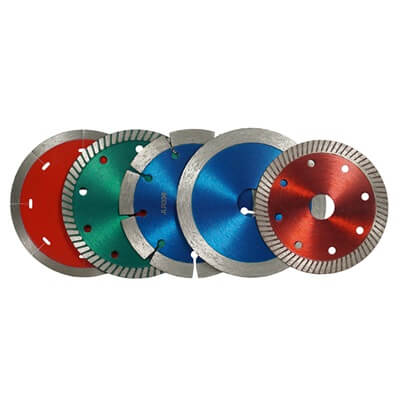
Concrete is a sturdy and durable material widely used in construction projects.However, using an grinder cut concrete is a good option if you need to change or remove a part of concrete at some point. Using an angle grinder and the right diamond blade, concrete may be sliced much more readily.In this blog post, we will explore the different types of diamond blades available for cutting concrete with an angle grinder and provide valuable tips for a successful cutting process.
For cutting through difficult materials like concrete, diamond blades are specially made. They feature synthetic diamond crystals embedded in a metal matrix, which make them incredibly durable and effective. When selecting a diamond blade for your angle grinder, consider the following types:

Turbo rim diamond blades have a serrated rim with segments that provide faster and smoother cutting. The design allows for efficient debris removal and cooling, preventing the blade from overheating. These blades can be used for both wet and dry cutting operations and are excellent for general-purpose cutting.
Continuous rim diamond blades have a smooth and uninterrupted edge, providing precise and chip-free cuts. These blades are commonly used for delicate cutting tasks that require high precision, such as tile or stone cutting. When cutting concrete, using water as a coolant is highly recommended to avoid blade overheating.
Segmented rim concrete blades have gaps or slots between the diamond segments. These blades are ideal for heavy-duty cutting tasks and can handle thick concrete with ease. The gaps in the segments allow for better cooling and debris removal, making them suitable for dry cutting applications. It is important to remember, nevertheless, that segmented rim blades could result in a harsher cut than other blade varieties.
Before you start cutting concrete with an angle grinder, it's crucial to take the necessary safety precautions and prepare the work area appropriately. Here are some essential steps:
Always wear protective gear, including safety glasses, gloves, hearing protection, and a dust mask. Concrete cutting can generate a significant amount of dust and debris, so it's vital to protect yourself.
Mark the area you want to cut using a chalk line or a marker.This helps guide your blade and ensures accuracy during the cutting process.
If possible, secure the concrete piece you're cutting to prevent it from moving or vibrating during the process. This can be done using clamps or by having someone hold it steadily.
Once you have prepared the work area and equipped your angle grinder with the appropriate diamond blade, follow these techniques for a successful concrete cutting process:
Begin by making a shallow cut along your marked line. This initial pass allows the diamond blade to establish a groove and prevents it from binding or jumping.
After the initial shallow cut, gradually increase the depth of your subsequent passes. Avoid forcing the blade or pushing too hard, as this can lead to overheating or damage to the blade.
Maintain a steady and controlled movement of the angle grinder along the marked line. Allow the diamond blade to do the cutting work while applying gentle pressure. Let the speed of the grinder and the sharpness of the blade determine the cutting pace.
To prevent overheating and prolong the life of your diamond blade, use water to cool it during the cutting process. This can be done by attaching a water supply or intermittently spraying water onto the blade and cutting area.
Inspect the cut section of the concrete to ensure that it meets your desired specifications. Check for any irregularities or areas that may require further adjustment.
Use a brush or a vacuum to remove the dust and debris generated during the cutting process. This will assist keep the workplace tidy and eliminate any potential risks.
If the cut edges are rough or uneven, you can use a masonry grinding wheel or a concrete rub brick to smooth them out. This will provide a more professional finish to your project.
Thoroughly clean your angle grinder and diamond blade, removing any concrete residue or debris. Properly store your equipment in a safe and dry place, ensuring that it is protected from damage.
When using an angle grinder to cut concrete, safety should always come first. Keep in mind the following safety advice:
Such as safety glasses, gloves, hearing protection, and a dust mask, at all times. You will be shielded from potential dangers like flying debris and excessive dust thanks to this.
Stand erect and comfortable when using the angle grinder. Maintain a firm grip on the tool and position yourself in a way that minimizes the risk of losing control.
To prevent overheating, periodically cool the diamond blade during the cutting process. Using water as a coolant is recommended, as it helps dissipate heat and prolongs the life of the blade.
Concrete cutting generates a significant amount of dust, which can be harmful if inhaled. Use a dust mask and consider using a wet cutting method or attaching a dust extraction system to minimize dust exposure.
Angle grinder concrete cutting might be difficult, but with the right diamond blade and the right methods, it becomes more manageable.
Understanding the different types of diamond blades and their applications is crucial for achieving precise and efficient cuts. Always put safety first by using the proper protective gear and using safe working procedures.
By following the steps outlined in this blog post, you'll be well-equipped to cut concrete effectively with an angle grinder.
It is crucial to stress that using an angle grinder to cut concrete takes competence and prudence.If you are new to this task or dealing with large-scale projects, it is advisable to seek professional assistance to ensure safety and accuracy.
When selecting a diamond blade for your angle grinder, consider factors such as the type of concrete you are cutting, the desired finish, and whether you will be performing wet or dry cutting. Each blade type has its advantages and is suitable for specific applications, so choose the one that best fits your needs.
Remember to prepare the work area properly, mark the cut line accurately, and secure the concrete piece to prevent movement. Take your time and make shallow cuts before gradually increasing the depth to avoid overheating the blade. Keep a steady and controlled movement while letting the blade do the cutting work.
After completing the cutting process, inspect the cut section, remove dust and debris, and smooth any rough edges if necessary. Clean and store your equipment properly for future use.
Always prioritize safety by wearing the appropriate personal protective equipment, maintaining stability while operating the angle grinder, and controlling dust exposure. Take breaks to allow the blade to cool and consider using a wet cutting method or a dust extraction system to minimize hazards.
Cutting concrete with an angle grinder can be a rewarding task when done correctly. With the right diamond blade, techniques, and safety measures in place, you can achieve precise and clean cuts for your construction or DIY projects. Remember to practice, gain experience, and seek professional assistance when needed.







